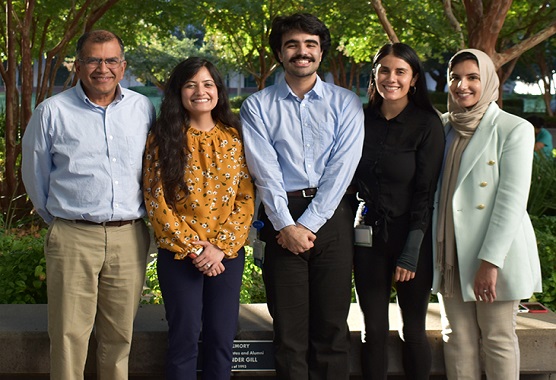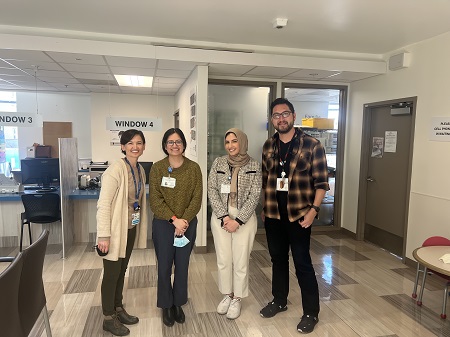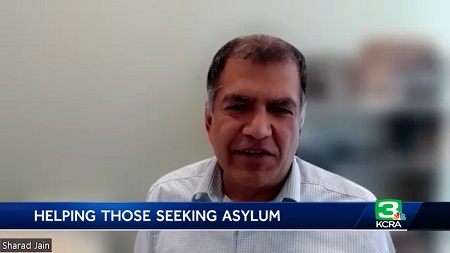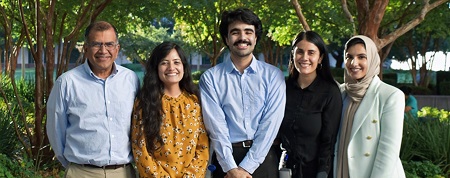Human Rights Initiative

About
The UC Davis Human Rights Initiative (HRI) provides forensic documentation of the physical and psychological manifestations of ill-treatment, torture, and trauma experienced by individuals applying for asylum and safety in the United States. The organization was founded in 2020, through the direction of Farah Shaheen, M.D. and Sharad Jain, M.D. in collaboration with medical students and attorneys.
Physicians
1. Complete AMTI Training
2. Shadow
3. Contact ucd.hri@ucdavis.edu for further instruction
Medical Students
1. Complete AMTI Training
2. Contact ucd.hri@ucdavis.edu for further instruction
Questions? Refer to Frequently Asked Questions below.

Contact us for any questions or to submit a referral by emailing ucd.hri@ucdavis.edu.
Q: How are patients referred to this clinic?
Individuals are referred by local organizations and attorneys who typically offer pro-bono to low-cost legal services to asylum seekers. Cases are also obtained through the Physicians for Human Rights (PHR) network. An interpreter for the medical/psychological evaluation is provided by the attorney. Upon receipt of an evaluation request via email, the director of UC Davis Human Rights Initiative screens the information for appropriateness, sets up a Zoom meeting or phone call to discuss the case further with the attorney, and sets an appointment for the evaluation.
Q: Who qualifies for a pro-bono evaluation at the UC Davis Human Rights Initiative?
We aim to serve all individuals seeking asylum, and we will not disqualify patients based on country of origin, socioeconomic status, gender, race, insurance status, or spoken language. The only time we will choose not to evaluate a client is if we believe that our services will not effectively support their asylum case.
Q: What is the service model at the UC Davis Human Rights Initiative?
The UC Davis Human Rights Initiative is under the joint direction of Farah Shaheen, M.D. and Sharad Jain, M.D., our faculty advisors. Clients are seen by a provider team: a faculty physician, who serves as the primary evaluator and a medical student or resident, who supports the evaluation. All evaluators are trained to conduct physical and psychiatric evaluations of asylum applicants. Other medical students may be present on site or virtually to assist with referrals and other social needs. A first draft of the affidavit is written by a medical student or resident physician. The faculty physician will prepare the final medico-legal documentation for submission to the attorney upon completion of a peer-review process.
Q: Are faculty and medical students trained in the Istanbul Protocol for asylum documentation
All participating faculty, providers, students, and residents are required to complete the online Asylum Medicine Training Initiative prior to shadowing and completing evaluations. This is a self-paced course based on the updated Istanbul Protocol. Student involvement will be focused on observation, supporting key aspects of the history, physical exam, mental status evaluation, as well as note taking, and client support. Any further involvement will be at the discretion of the faculty provider performing the evaluation.
Q: What type of documentation will be produced?
Faculty volunteer physicians will be responsible for writing the affidavit (preliminary draft provided by medical student or resident physician), which may include photos and body diagrams to be submitted to the referring attorney. We will document consistent with the Istanbul Protocol and have developed a standard form to guide the production of high-quality documentation. We recommend that the completed documentation draft be ready for review by the attorney within two weeks of the evaluation date.
Q: Are you offering trainings for clinicians interested in getting involved but have no experience?
Interested individuals can complete a self-paced forensic asylum evaluation training via the Asylum Medicine Training Initiative.
Q: Can clients receive medical care at the UC Davis Human Rights Initiative?
The Human Rights Initiative will only serve the needs of asylee applicants for the medical/psychological evaluation. It is not a medical care site. We will not be diagnosing or treating medical conditions. However, we may provide referrals for further care.
Q: How can I get involved?
Please email us at ucd.hri@ucdavis.edu to receive more information about our work!
Shifa Clinic | Culturally sensitive care for an ethnically diverse community
Shifa Clinic is a student-run clinic providing free services to the greater Sacramento community. Shifa Clinic strives to understand, serve, and promote the health and wellness needs of a multilingual, ethnically diverse patient population. Adjacent to a mosque in downtown Sacramento, the clinic primarily serves patients from the South Asian and Muslim communities but provides care to all individuals, regardless of race, gender, ethnicity, and religion.
Shifa Clinic has separately also served as the home base for UC Davis Human Rights Initiative to complete asylum evaluations. The Human Rights Initiative is grateful for the generosity of the medical director, Shagufta Yasmeen, M.D. as well as each generation of clinic managers, for allowing Human Rights Initiative to use this space.
Sundays: 8:30 a.m.-2 p.m.
419 V Street, Suite A
Sacramento, CA 95818
916-441-6008
Knights Landing Center
The Knights Landing One Health Center, Medical Clinic aims to provide linguistically competent and culturally humble healthcare services to the rural underserved in the Knights Landing area, with a particular emphasis on women, adolescents, and farm workers. Our goal is to provide community-centered care by maintaining a high level of community engagement and empowerment, and by continuing to collaborate with other organizations. We are striving to develop a One Health model, linking human, animal, and environmental health.
Separately, the Human Rights Initiative has formed a collaboration with Knights Landing Clinic to connect individuals who have received asylum to their Immigration Clinic, to assist these individuals with applying for their green card.
First and third Sundays - 8 a.m. - closing
9586 Mill Street
Knights Landing, CA 95645
530-421-8061
Paul Hom Asian Clinic | Commitment to the Asian community
For the Asian and Pacific Islander community, the Paul Hom clinic provides primary and acute care services. Founded in 1972, it is the oldest Asian health clinic in the United States.
6341 Folsom Blvd.
Sacramento, CA 95819
916-736-3966
Clinica Tepatí | Primary care services for the Latino community
Clinica Tepati began in 1974, with a focus on serving downtown Sacramento's underserved and undocumented Latino population. Spanish interpretation services available. The clinic also provides diabetes education, exercise programs, and legal and specialty services for our patient populations.
Saturdays 8 a.m. - closing
1820 J Street
Sacramento, CA 95814
916-209-0912
Imani Clinic | Healing begins with faith
Imani is a Swahili word meaning faith and it symbolizes the hope students wish to foster within the African-American community. The clinic was established in the Oak Park neighborhood of Sacramento in 1994.
Saturdays 8 a.m. - 1 p.m.
2425 Alhambra Blvd.
Sacramento, CA 95817
916-475-9582
Joan Viteri Memorial Clinic | Health care and harm reduction services
The Joan Viteri Memorial Clinic is equipped with specific resources to treat individuals who use intravenous drugs, individuals who work in the sex trade, members of the LGBTQ community, and uninsured members of the Oak Park community while treating all patients with dignity and respect.
Saturdays 1-5 p.m.
3647 40th Street
Sacramento, CA 95817
916-456-4849
Bayanihan Clinic | Culturally sensitive care to an extraordinarily diverse community
Established in 2002, Bayanihan Clinic provides accessible primary and preventative healthcare to Filipino immigrants and all diverse, underserved communities of the Greater Sacramento area, while honoring the legacy of Filipino veterans through advocacy and community engagement.
Saturdays 8 a.m. - 12 p.m.
3030 Explorer Drive
Rancho Cordova, CA 95670
916-234-6773
The Willow Clinic | Healthcare for people who are experiencing homelessness
Established in 2009, The Willow Clinic provides free care to all people, including those with housing instability, in the greater Sacramento area, providing primary care services alongside specialized services tailored to better meet the needs of unhoused individuals, including gynecology, dental, behavioral health, diabetes support, ophthalmology, and smoking cessation.
Saturdays 8 a.m.- 12 p.m.
3030 Explorer Drive
Rancho Cordova, CA 95670
916-234-6773
Recognizing Illness Very Early and Responding Clinic (R.I.V.E.R.)
RIVER is a pediatric clinic providing free primary care and mental health services to the underserved population in Sacramento. A seamless referral system for specialized care and mental health services through our affiliation with the Department of Pediatrics and the UC Davis Children's Hospital will promote sustainability by connecting disenfranchised families to pediatric medical homes, mental health providers, and resources in the community and investing in coordinated prevention services.
First and third Saturday 9 a.m. - 1 p.m. (walk-ins are welcome)
3535 65th Street Building C.
Sacramento, CA 95820
530-564-8439
-

UC Davis School of Medicine Volunteers Aid Asylum Seekers In Sacramento
Read morearrow_forwardA Northern California refugee rescue group and volunteers with UC Davis School of Medicine are teaming up to help people seeking asylum.
-

School of Medicine Volunteers support Asylum Applicants
Read morearrow_forwardA group of UC Davis medical students, resident physicians and professors are improving the lives of people who fled to the United States after being persecuted in their home country.
